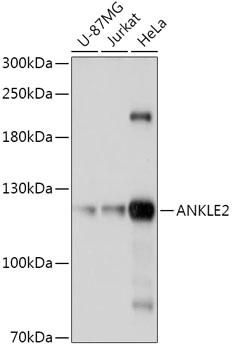Cell Biology Antibodies 13
Anti-ANKLE2 Antibody (CAB17654)
- SKU:
- CAB17654
- Product Type:
- Antibody
- Reactivity:
- Human
- Reactivity:
- Mouse
- Reactivity:
- Rat
- Host Species:
- Rabbit
- Isotype:
- IgG
- Antibody Type:
- Polyclonal Antibody
- Research Area:
- Cell Biology
Description
| Antibody Name: | Anti-ANKLE2 Antibody |
| Antibody SKU: | CAB17654 |
| Antibody Size: | 20uL, 50uL, 100uL |
| Application: | WB IHC |
| Reactivity: | Human, Mouse, Rat |
| Host Species: | Rabbit |
| Immunogen: | Recombinant fusion protein containing a sequence corresponding to amino acids 350-450 of human ANKLE2 (NP_055929.1). |
| Application: | WB IHC |
| Recommended Dilution: | WB 1:500 - 1:2000 IHC 1:50 - 1:200 |
| Reactivity: | Human, Mouse, Rat |
| Positive Samples: | U-87MG, Jurkat, HeLa |
| Immunogen: | Recombinant fusion protein containing a sequence corresponding to amino acids 350-450 of human ANKLE2 (NP_055929.1). |
| Purification Method: | Affinity purification |
| Storage Buffer: | Store at -20°C. Avoid freeze / thaw cycles. Buffer: PBS with 0.02% sodium azide, 50% glycerol, pH7.3. |
| Isotype: | IgG |
| Sequence: | CRYN VMHV AAKE NQAS ICQL TLDV LENP DFMR LMYP DDDE AMLQ KRIR YVVD LYLN TPDK MGYD TPLH FACK FGNA DVVN VLSS HHLI VKNS RNKY DKTP E |
| Gene ID: | 23141 |
| Uniprot: | Q86XL3 |
| Cellular Location: | |
| Calculated MW: | |
| Observed MW: | 104kDa |
| Synonyms: | KIAA0692, LEMD7, Lem4, MCPH16, ANKLE2 |
| Background: | This gene encodes a member of the LEM family of inner nuclear membrane proteins. The encoded protein functions as a mitotic regulator through postmitotic formation of the nuclear envelope. Mutations in this gene cause morphology defects in the nuclear envelope and BAF hyperphosphorylation. [provided by RefSeq, Mar 2014] |
| UniProt Protein Function: | ANKLE2: Involved in mitotic nuclear envelope reassembly by promoting dephosphorylation of BAF/BANF1 during mitotic exit. Coordinates the control of BAF/BANF1 dephosphorylation by inhibiting VRK1 kinase and promoting dephosphorylation of BAF/BANF1 by protein phosphatase 2A (PP2A), thereby facilitating nuclear envelope assembly. It is unclear whether it acts as a real PP2A regulatory subunit or whether it is involved in recruitment of the PP2A complex. Belongs to the ANKLE2 family. 3 isoforms of the human protein are produced by alternative splicing. |
| UniProt Protein Details: | Protein type:Membrane protein, integral Chromosomal Location of Human Ortholog: 12q24.33 Cellular Component: endoplasmic reticulum membrane; membrane; integral to endoplasmic reticulum membrane Molecular Function:protein binding; protein phosphatase 2A binding; protein phosphatase type 2A regulator activity Biological Process: mitosis; mitotic nuclear envelope reassembly; cell division; regulation of catalytic activity; negative regulation of phosphorylation; mitotic cell cycle; positive regulation of protein amino acid dephosphorylation |
| NCBI Summary: | This gene encodes a member of the LEM family of inner nuclear membrane proteins. The encoded protein functions as a mitotic regulator through postmitotic formation of the nuclear envelope. Mutations in this gene cause morphology defects in the nuclear envelope and BAF hyperphosphorylation. [provided by RefSeq, Mar 2014] |
| UniProt Code: | Q86XL3 |
| NCBI GenInfo Identifier: | 148664230 |
| NCBI Gene ID: | 23141 |
| NCBI Accession: | NP_055929.1 |
| UniProt Secondary Accession: | Q86XL3,O75176, Q6P6A5, Q8TAZ9, Q96DH4, A8KAG3, B3KN97 B3KSF8, |
| UniProt Related Accession: | Q86XL3 |
| Molecular Weight: | 31,982 Da |
| NCBI Full Name: | ankyrin repeat and LEM domain-containing protein 2 |
| NCBI Synonym Full Names: | ankyrin repeat and LEM domain containing 2 |
| NCBI Official Symbol: | ANKLE2 |
| NCBI Official Synonym Symbols: | Lem4; LEMD7; KIAA0692 |
| NCBI Protein Information: | ankyrin repeat and LEM domain-containing protein 2 |
| UniProt Protein Name: | Ankyrin repeat and LEM domain-containing protein 2 |
| UniProt Synonym Protein Names: | LEM domain-containing protein 4 |
| Protein Family: | Ankyrin repeat and LEM domain-containing protein |
| UniProt Gene Name: | ANKLE2 |
| UniProt Entry Name: | ANKL2_HUMAN |







